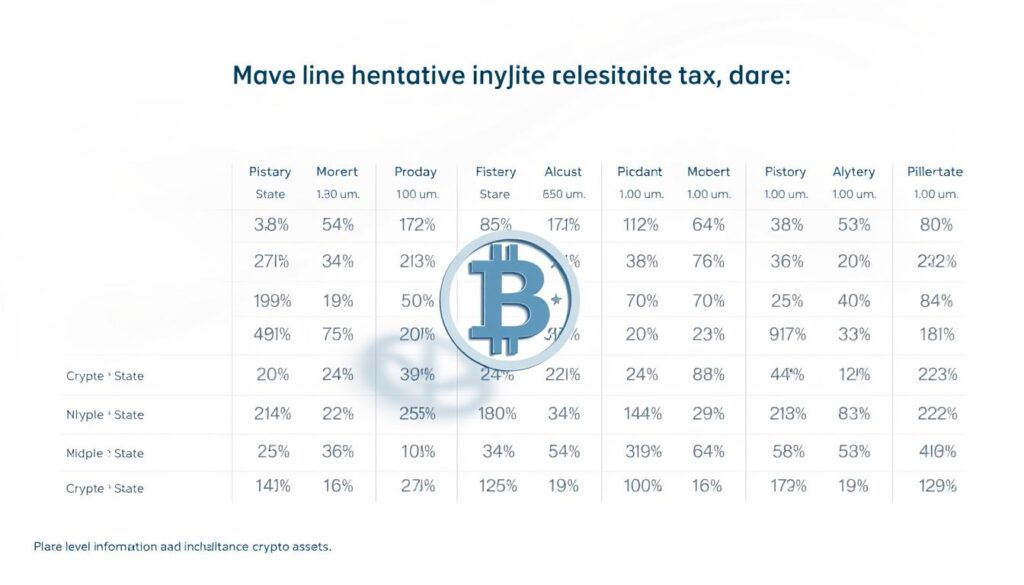Managing tax for inherited cryptocurrency can be tricky. This guide helps you understand crypto tax reporting for inherited assets. It covers IRS rules and how to document your steps. Beneficiaries need to track their inherited crypto, like Bitcoin or Ethereum, to avoid fines.
Tax on inherited cryptocurrency involves specific forms and ways to value your assets. This ensures you follow the rules.
Key Takeaways
- Reporting inherited crypto assets to the IRS requires precise cost basis calculations.
- Documentation like death certificates and estate records prove ownership transfers.
- Forms like Form 8949 and Schedule D are critical for crypto tax reporting for inherited assets.
- State laws may add inheritance tax obligations beyond federal requirements.
- Missing records risk audits; reconstructing transaction history is often necessary.
Understanding the Fundamentals of Inherited Cryptocurrency
Managing inherited cryptocurrency means dealing with inherited cryptocurrency tax rules. These rules come from federal and state laws. This part explains how crypto assets go to heirs and the duties that come with them.
What Constitutes Crypto Inheritance for Tax Purposes
For crypto inheritance tax implications to kick in, assets must go through legal estate handling. This includes crypto in a will, given out by an executor, or claimed without a will. But, just sharing a wallet without official transfer papers doesn’t count under IRS rules.
Gifted vs. Inherited Crypto: Tax Treatment
- Inherited crypto gets a step-up in basis to its value at the owner’s death.
- Gifted crypto keeps the original owner’s cost basis, affecting future taxes.
- Inheritance skips gift tax but needs the right paperwork.
Required Documentation for Legal Proof
Heirs need to collect: death certificates, letters from executors, and blockchain records showing asset moves. They also need estate account records and probate court papers for tax forms. Without these, the IRS might audit them for crypto tax compliance.
The IRS Stance on Crypto Tax Reporting for Inherited Assets
The IRS views inherited cryptocurrency as property. This means you must report it to avoid penalties. The tax on it depends on its value at the time of death or six months later.
Keeping track of your transactions is key. This ensures you follow the IRS rules for taxing inherited crypto assets.
The Infrastructure Investment and Jobs Act has changed things. Now, brokers must report crypto transactions over $10,000. This affects inheritors.
The IRS is serious about making sure you report correctly. They use Operation Hidden Treasure to find unreported crypto. You need to keep records of when you bought or sold and their values.
If you don’t report right, you could face audits or fines. The IRS wants you to be open about your crypto. They treat it like traditional property. Check out IRS publications 550 and 541 for more information. Stay up to date to avoid legal trouble.
Determining the Cost Basis for Inherited Digital Assets
Getting the cost basis right is key for crypto tax reporting for inherited assets. The IRS wants you to find the fair market value (FMV) at certain times. This helps you pay the right amount of taxes and follow cryptocurrency inherited assets tax treatment rules.
- Major exchange rates at valuation date
- Volume-weighted average prices from crypto tracking platforms
- Third-party appraisal services specializing in digital assets
Step-Up Basis Rules Applied to Cryptocurrency
Inherited crypto gets a new cost basis based on the date of death valuation. For instance, if someone bought Bitcoin for $30,000 and died with it worth $60,000, the heir’s basis is $60,000. This “step-up” means no taxes on the pre-death gain. But, any increase in value after death is taxable when sold.
Date of Death Valuation vs. Alternate Valuation Date
Estate executors have to pick between the date of death value or a later date, six months after death. This choice affects estate taxes:
- Go with the date of death if values are steady
- Opt for the alternate date if values drop in the six months
This decision is important for both federal and state cryptocurrency inherited assets tax treatment. Auditors check if the chosen dates match market data from trusted sources like CoinMarketCap or blockchain analytics.
Required Tax Forms for Reporting Inherited Cryptocurrency
When it comes to inherited bitcoin tax reporting, you need the right documents. You’ll need Form 8949, estate tax returns, and foreign asset reports. Each form has its own role in following federal tax rules.
Form 8949 and Schedule D Requirements: If you sell inherited crypto, you must use Form 8949 to figure out your gains. You’ll need to fill in the stepped-up basis date on line 1a and the disposition date in column (f). This information goes to Schedule D, where you mark the assets as inherited. Getting this right helps avoid audits.
- Form 8949 must include wallet addresses identifiers
- Cost basis entries require IRS-approved valuation sources
Estate Tax Returns and Crypto Reporting: If your estate is worth more than $13.6 million, you’ll need to file Form 706. List your crypto under “miscellaneous assets” with its value at the time of death. Executors must also share wallet balances and transfer records to avoid IRS penalties.
FBAR and FinCEN Considerations: If you have foreign crypto accounts with over $10,000, you must file FinCEN Form 114. Even if you’ve closed accounts, you still need to report them if you’ve accessed them recently. The Treasury now requires wallet ID disclosures for international assets.
Capital Gains Calculations for Inherited Crypto Assets
Calculating capital gains for inherited crypto is different. It follows inherited cryptocurrency tax rules. This means you can lower the tax on inherited cryptocurrency. The stepped-up basis rule sets the cost basis to the asset’s value at the time of death. This rule eliminates the gains from the previous owner.
When you sell inherited crypto, you calculate gains or losses from this new basis. For instance, if Bitcoin was worth $50,000 at the owner’s death and you sell it for $60,000, you have a taxable gain of $10,000. Any sale after one year is considered long-term, which has better tax rates.
- Partial Sales: Track portions sold vs. retained using proportional cost basis allocation.
- Declining Values: If crypto drops below the stepped-up basis, losses can offset other gains (up to $3,000 annually).
- Complex Holdings: Assets across multiple wallets/exchanges require aggregated reporting for accurate basis tracking.
Mining rewards or staked crypto inherited mid-contract may need special valuation. Staked ETH locked at death keeps its valuation date basis. But, unlocked portions follow standard rules. Always document all transactions after inheritance to meet IRS disposal reporting needs.
State-Specific Inheritance Tax Considerations for Cryptocurrency

Crypto inheritance tax rules change a lot from state to state. This makes it hard for people to know what to do. Twelve U.S. states have inheritance or estate taxes, and their crypto rules are not always clear.
In Wyoming, things are easier because there’s no estate tax and clear crypto rules. But in New York, the BitLicense rules make things more complicated for inherited crypto. Knowing these differences is key to avoid mistakes when reporting crypto taxes.
- States with crypto-friendly policies: Wyoming’s lack of estate tax and crypto-specific statutes simplify reporting.
- States with inheritance taxes: Iowa, Kentucky, Maryland, and Pennsylvania require separate filings for digital assets.
- Residency complexities: Beneficiaries must prove domicile to avoid double taxation across states.
Residency Rules and Multi-State Inheritance Situations
When dealing with inheritance across states, you need to be very careful. For instance, if someone died in New York but had property in Texas, you must file in both places. Use tracking tools to keep track of transactions.
States like Massachusetts and Oregon tax estates based on where the person lived, not where the heirs are. Always check the rules for valuing assets at the time of death in each state to avoid fines.
States with Specific Crypto Inheritance Provisions
In Hawaii and Illinois, you must list crypto as “intangible assets” on estate forms. Pennsylvania’s inheritance tax rates go up with the value of the assets, affecting big crypto holdings. Always check with local tax offices to see if your state treats NFTs or stablecoins differently.
Common Pitfalls When Reporting Inherited Digital Assets
Handling inherited bitcoin tax reporting and crypto estate tax reporting needs care to avoid big mistakes. Many heirs miss basic steps like checking legal ownership papers. The IRS checks these papers closely during audits.
Not keeping inherited crypto separate from personal funds in the same wallet messes up cost basis records. This makes it hard to figure out taxes. A 2023 IRS fact sheet warns that using the original purchase price instead of the death value can lead to overpaying taxes.
- Ignoring hidden wallets or decentralized platforms during asset check leads to missing parts of the report.
- Mixing up short-term and long-term gains for inherited crypto changes tax brackets.
- Not recording crypto-to-crypto trades after inheritance leaves gaps in Form 8949 records.
- Missing the 9-month deadline for valuing assets after death affects estate taxes.
To stay ahead, keep inherited assets in separate wallets and save screenshots of price charts from the death date. Crypto estate tax reporting requires detailed records of all trades and private keys. Taxpayers should look at IRS Publication 551 for valuation tips and keep all blockchain logs. By avoiding these common mistakes, you can follow the rules and save money with correct inherited bitcoin tax reporting.
Professional Assistance: When to Consult a Crypto Inheritance Tax Advisor
When dealing with complex crypto tax situations, getting help is key. This is especially true for big inheritances, multiple assets, or international holdings. Experts can help save money and follow IRS rules.
Qualifications to Look for in a Crypto Tax Specialist
Look for advisors with CPA or Enrolled Agent licenses. They should also have experience with crypto. Check if they have the Digital Asset Tax Alliance (DATA) certification.
Ask for references from people with similar crypto inheritance situations. Make sure they know about Form 8949, Schedule D, and FBAR for digital assets.
Cost-Benefit Analysis of Professional Tax Preparation
- Fee structures: Hourly rates are $200–$300. Flat fees for crypto tax services are $800–$2,500, based on complexity.
- Risk reduction: Not reporting crypto can lead to penalties over 50% of taxes owed. Experts help avoid these by ensuring accurate reporting.
- Time savings: Without an expert, complex estates can take 20+ hours to document.
For small estates or simple transfers, you might handle it yourself. But for big or global assets, a pro is essential for following new rules.
Special Scenarios: Inheriting Crypto from Foreign Estates
Inheriting cryptocurrency from a foreign estate has its own inherited cryptocurrency tax rules. If you live in the U.S. and get crypto from someone outside the country, you must follow IRS rules. You also need to consider international tax treaties. Not reporting can result in penalties under FATCA, which makes sure offshore assets are transparent.

Getting crypto from abroad means you need to file Form 3520 if the estate value is over $100,000. The main challenges are proving you own the crypto and figuring out the cryptocurrency inherited assets tax treatment. Since foreign exchanges don’t always keep records the IRS wants, you might have to use third-party price indices to show the crypto’s value at the time of death.
- Double taxation risks: Make sure you’re not taxed twice by checking treaty exemptions.
- Currency conversion: Keep track of exchange rates when the crypto was traded in non-USD markets.
- Documentation hurdles: Get death certificates and legal papers from abroad with an apostille and translation.
Tracking cross-border crypto transfers requires careful record-keeping. Without the original wallet keys or transaction records, you might need forensic analysis to prove you own it. Getting help from a professional can be key in dealing with the differences between U.S. and foreign inheritance laws.
Tax Planning Strategies for Future Crypto Inheritors
Planning ahead can help lower crypto inheritance taxes for both the giver and the receiver. Families with crypto need to tackle ownership transfers, valuation issues, and legal rules early.
Trust Structures for Secure Crypto Transfers
Trusts are a good way to manage crypto assets without waiting for probate. Revocable living trusts let owners keep control and ensure smooth transfers to heirs. Irrevocable trusts can protect assets from estate taxes but mean giving up ownership rights. Important steps include:
- Storing private keys in multi-signature wallets for trustee access
- Designating custodial agreements for cold storage devices
- Updating trust documents annually to reflect market value shifts
Strategic Lifetime Transfers
Lifetime gifting uses annual exclusions up to $17,000 per person in 2023. Spreading out gifts can reduce estate tax. Donor-advised funds let you give to charity and get tax benefits. Charitable remainder trusts can give heirs income while lowering taxes.
Getting advice from a crypto inheritance tax advisor is key. They help with tax rules and state laws. A good plan also teaches heirs about managing crypto to avoid disputes later.
For more on trust structures, check out estate planning for digital assets. Regular checks of crypto against IRS rules keep you in line with tax laws.
Handling Missing or Inaccessible Crypto Inheritance Information
When you inherit cryptocurrency, missing records or locked wallets can make inherited bitcoin tax reporting hard. You might face challenges like missing transaction histories or seed phrases that are hard to find. Here are some steps to help you meet IRS rules:
- Use blockchain explorers to trace wallet activity and establish purchase dates.
- Contact exchanges where the deceased held accounts to retrieve historical data.
- Employ crypto tax software that analyzes blockchain transactions to estimate cost basis.
The IRS lets you make reasonable guesses when exact records are missing. Tax on inherited cryptocurrency filings can use estimates. You can use industry benchmarks or third-party appraisals, as allowed by Revenue Procedure 2021-24. Keep detailed records of your efforts to recover data. This helps lower the risk of audits.
Technical issues like encrypted wallets or split seed phrases might need expert help. Blockchain forensic services can get transaction details without unlocking wallets. Estate recovery experts can help with setups needing cooperation from multiple parties. Always document your recovery attempts and any consultations for audit protection.
Timeline and Deadlines for Reporting Inherited Cryptocurrency
Deadlines for crypto tax reporting for inherited assets are strict. Executors must file Form 706 within 9 months if the estate is over federal exemptions. This crypto estate tax reporting starts important steps like picking a 6-month alternate valuation date. Beneficiaries have standard April 15 filing dates but might get extensions.

- 9-Month Window: File Form 706 to report estates over $13,600,000 (2024 threshold). Failure risks penalties.
- 6-Month Option: Choose alternate valuation date for asset values within six months of death.
- Beneficiary Filing: Report inherited crypto gains/losses by April 15 each year after the death.
- Extensions Available: Apply for Form 706 extensions up to 8 months post-death.
- Delayed crypto wallet access requires reconstructing transaction history to meet deadlines.
- Trust distributions may shift reporting timelines if assets remain in estate control.
- Foreign crypto holdings need FBAR filings alongside standard tax forms.
The statute of limitations is 3 years after filing or 2 years after payment. Errors like unreported crypto can extend this period. Keep track of all deadlines to avoid audits or fines. Executors and beneficiaries must work together to meet IRS requirements.
Practical Example: Complete Reporting Workflow for Bitcoin Inheritance
Imagine getting 2.5 Bitcoin after a family member passes away. Proper inherited bitcoin tax reporting is key. First, collect legal papers like the death certificate and probate records. Keep track of wallet transfers to show you own it. Use exchange data from the death date to figure out the value.
Initial Assessment and Documentation
- Make sure you got the Bitcoin legally with court papers.
- Write down the Bitcoin wallet addresses and transaction hashes from the deceased’s accounts.
- Use the average price from exchanges on the death date to calculate the value. For example, $68,000/BTC on Dec 1, 2023.
Tax Form Completion
Fill out Form 8949 with the stepped-up basis. Write “Date of Death FMV” in Column D. For 2023 sales, report gains based on the inherited basis. For instance, selling 1 BTC in 2024 at $75,000 would mean a $7,000 gain. Attach IRS Form 8949 to Schedule D, Section D for inherited assets.
Audit Red Flags to Avoid
- Discrepancies between beneficiaries’ reported values for the same inheritance
- Failure to check the “virtual currency” box on Form 1040
- Gaps in wallet transaction records
Following inherited cryptocurrency tax rules closely is crucial. Keep digital records of all transactions and valuation sources for audit protection.
Navigating Your Crypto Inheritance Tax Journey: Next Steps and Resources
When dealing with cryptocurrency inheritance taxes, planning is key. Start by talking to a crypto inheritance tax advisor. They can help you understand IRS rules and avoid mistakes.
IRS resources like Publication 559 and the FinCEN website are great for guidance. Use crypto tax software like CoinTracking or ZenLedger to keep track of your transactions. These tools help you stay organized and up-to-date with tax changes.
Services like Coinbase’s inheritance solutions make reporting easier. Keep detailed records, even for small amounts, to avoid audits. Remember, state laws also apply if your assets are in different places.
Check your crypto portfolio every year. Advisors can help with trusts or gifting to lower taxes. Taking these steps now makes tax time easier for you and your heirs.
FAQ
What are the crypto tax reporting requirements for inherited assets?
Inherited cryptocurrency is seen as property by the IRS. You must report its value at the time of the owner’s death on your taxes. It’s key to have proof of inheritance and follow the rules for any sales.
How should I document my inheritance of cryptocurrency?
You’ll need the death certificate, will documents, and records of the transfer. These prove you got the crypto legally for tax purposes.
Are there different tax implications for gifted versus inherited cryptocurrency?
Yes, inherited crypto gets a new basis at the owner’s death value. But gifted crypto keeps the original cost basis. This affects taxes when you sell it.
What forms do I need to file for reporting inherited cryptocurrency?
You’ll likely need Form 8949 and Schedule D for sales. If it’s part of a big estate, you might also need Form 706 for estate taxes.
How do I determine the cost basis for the inherited cryptocurrency?
The basis is the value at the owner’s death. You can use exchange rates or average prices from different places to figure this out.
What are the capital gains tax considerations when selling inherited crypto?
Selling inherited crypto gets a new start on taxes. This means lower rates if sold after a year. It’s because of the stepped-up basis rule.
What are the state-specific inheritance tax considerations for cryptocurrency?
State laws on crypto inheritance taxes vary a lot. Some have special rules, while others tax estates or inheritances. This can change how much tax you pay.
When should I consult a crypto inheritance tax advisor?
Get a tax advisor for complex estates, big inheritances, or assets across borders. They ensure you follow the rules and save on taxes.
What are common pitfalls to avoid when reporting inherited cryptocurrency?
Don’t miss documenting the inheritance, misjudge the holding period, or use the wrong basis. Avoiding these mistakes helps you report correctly and save on taxes.
How can I handle situations where I am missing inheritance information for my crypto assets?
If you’re missing info, use blockchain explorers and ask for transaction histories. Showing you tried to get this info can help with taxes.
What are the IRS’s current guidelines on inherited cryptocurrency taxation?
The IRS views inherited crypto as property and requires reporting. Knowing IRS rules and updates is key for tax compliance.


No comments yet